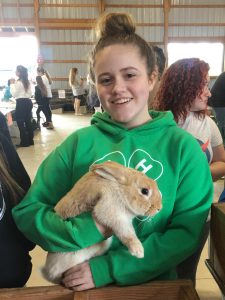Main Content
In the 4-H Rabbit Project youth learn about selection and raising their animals, but they also explore science, technology, health issues, management practices, careers, and much more! It is important for 4-H members to learn how science and technology are a vital part of many aspects of the 4-H Rabbit Project.
The overall learning objectives of the 4-H Rabbit Project are:
- to learn and practice the basic principles of animal science by owning, caring for, and keeping records on one or more rabbits;
- to explore and develop knowledge of sound breeding, feeding, and management practices; and
- to investigate marketing, project expansion and how you can start a career in the rabbit business.
Specific learning objectives vary according to the project level – Beginner (Level 1), Intermediate (Level 2) or Advanced (Level 3).
Level 1 – Beginner
Youth will:
- Learn the different breeds, varieties, characteristics, and ideal weights.
- Locate and name parts of a rabbit.
- Develop a rabbit care management plan.
- Identify rabbit equipment and its uses and learn proper feeding techniques.
Level 2 – Intermediate

Youth will:
- Learn to judge rabbits and give oral reasons.
- Explore the different rabbit body types and their function.
- Learn proper grooming techniques.
- Learn how to condition your rabbits for show.
- Develop a plan for preparing rabbits for show.
- Learn about diseases and environment concerns.
Level 3 – Advanced
Youth will:
- Identify bones on a rabbit skeleton.
- Evaluate rabbit health.
- Develop and maintain a rabbit pedigree system
- Learn about rabbit breeding programs and genetics.
- Learn how to design and manage a rabbitry.
- Analyze and plan proper facilities for rabbits.
- Learn the science behind rabbit nutrition, growth and development, genetics, and the multiple aspects of the rabbit industry
Project materials to assist 4-H members in learning may be available through your county 4-H office or you can order the 4-H Skills for Life Animal Science Series Rabbit Curriculum directly from National 4-H Council 4-H Mall (www.4-hmall.org) via the following link: https://shop4-h.org/collections/curriculum
The 4-H Rabbit Curriculum includes Rabbit Member Books (Level 1-3) and a Helper’s Guide to assist 4-H volunteer leaders in facilitating educational activities and learning opportunities. Below is a description of the books and the suggested grade level.
Rabbit Level 1 – What’s Hoppening?: Youth will discover how to identify breeds, handle and show rabbits, identify rabbit parts and equipment, recognize a healthy rabbit, read a pedigree and kindle a litter. (40 pages) Grades 3-5
Rabbit Level 2 – Making Tracks: Youth will recognize body types, judge and show rabbits, tattoo a rabbit, keep records, identify diseases, administer medication, record growth rates and market products. (40 pages) Grades 6-8
Rabbit Level 3 – All Ears: Older youth will develop a breeding program, design a rabbitry, cull based on production, prevent diseases, develop sportsmanship and develop a marketing plan. (40 pages) Grades 9-12
Adapted from: University of Florida/IFAS Extension 4-H Rabbit Project Handout
By Jeannette Rea Keywood, State 4-H Agent, Department of 4-H Youth Development, Rutgers Cooperative Extension